Editor’s Note: The following is an edited 1998 interview with Eric Cottle done by historian Linsey Lee; the complete interview appears in her book Vineyard Voices. Mr. Cottle died April 2 at the age of 92. Ms. Lee heads the oral history center for the Martha’s Vineyard Museum.
I grew up in Menemsha. So did my parents and grandparents. They went to school together. Same as Marguerite and I. We did the same thing. Our house had kerosene lights and a kerosene stove. Had a coal stove too, and in the living room we had a wood stove. It was my job on Saturdays to cut enough wood to last a week. My father had a wood lot up on the Crossroad. He would get it cut and bring it down in eight-foot lengths that I had to cut up into foot lengths with a buck saw. I thought I was put upon. I’m sure it didn’t hurt me a bit.
Knew everybody that owned here. Actually there was more people that lived in the Creek than there is now, year-round. I suppose there was 35, 40 people. There was somebody in just about every house all year. And everybody, the older people, we always called them uncle and aunt. There was a Dan Vincent and his wife was Georgie Vincent and it was Uncle Dan, Aunt Georgie. We didn’t call him Mr. Vincent, always uncle. Everybody was uncle and aunt. I don’t think I was related to any of them. Everybody looked out for us. They were good to us, good to the kids, the older people were. They really were.
I used to go over to Aunt Georgie’s and play Flinch. I don’t remember how to play it now, but she loved to play Flinch. She’d flinch me. Then she’d laugh, got a great charge out of flinching. And I used to go over to Willy Mayhew’s, stop in there, and he’d make some tea and I used to have some tea and crackers with him.
I used to borrow David Butler’s skiff. He said, “There’s a skiff. Anytime you want it, take it.” So I’d go down, get the skiff, and row around the Basin. Told all the kids the same thing. “You want a boat? Nobody’s using it. Take it. The oars are in it. Take it. Just tie it up when you’re through, that’s all I ask.” They treated us good.
A lot of the houses didn’t have any insulation. You had outside walls was all you had. See the nail heads. Now, down in the house, cold morning, you’d see every nail head, white. Frost on it. Break ice in the bucket if you wanted to wash your face before the stove was going.
Didn’t have any running water at all. We’d get our water from the brook. Sunday afternoon, it was my job to lug about 20 buckets of water for mother to wash clothes and rinse them in. Took quite a few trips. My father dug a hole and put a barrel down in there and we’d dip it out of that. Good water, great water. That’s before they built any houses on the brook, see?
Didn’t have any electricity. Didn’t think anything about it. Thought everybody did the same thing. I didn’t know I was poor until they came from the mainland and told me. Some of these summer people come, said, “My God, you folks are some poor.” I didn’t know it. I was happy.
My father’s grandparents were both deaf-mutes. His mother wasn’t very well after he was born so he went to live with his grandparents. And of course they didn’t speak. So everybody thought he was a deaf-mute because he never spoke, because he didn’t hear anybody speak. And somebody went there one day and said his name, and he turned his head. And they said, “I believe he can hear.” He could hear all right. But his grandparents didn’t speak, so he didn’t know how to talk until he was, well, three or four years old. I don’t say that’s the absolute truth, but that’s what I’ve always heard.
He knew all the signs. He could talk good using both hands. Everybody did. I knew quite a few signs then, but I’ve kind of forgotten them now. I don’t remember too many, but I remember some.
There was three or four people in Chilmark that were deaf-mutes when I was young. Fellow by the name of Josie West who loved to play cards. We’d go over to the post office. It’s where that Lombardi’s is now. The mail come in there and we’d go in there and Josie would be there, playing cards. So I knew the signs for suits. He was a good card player, too. I could talk to him. Of course, it was hard because most of them couldn’t spell. So you had to guess. They’d have two or three letters, then you’d have to guess. If you were carrying on a conversation, you could pick it up. You could figure out what they were talking out. But it was a language all their own. Different language. They had a different language on the mainland than they did around here.
I went to the Chilmark School. It was called the Chilmark School then. No self-respecting Menemshan would call that Menemsha over there. That’s Chilmark and this is Menemsha, see? Because Menemsha runs from top of the hill down to the Creek. Rest of it is Chilmark. We walked to school. It was just one room, eight grades. One teacher. That was Maude Reed. And don’t look cross-eyed or she’s got you. She was hard. She was good, though. If you couldn’t learn with her, there was no hope for you. Good teacher. There was about thirty, thirty-five students in school. Somebody would be reciting all the time, you know. You learned to concentrate.
After school I would come home, and usually I’d go down to the Creek. In the wintertime, the men would be in the different shacks, shucking scallops, and I’d go down, go from one shack to another and see what they were doing until dinnertime, then I’d come home. I spent most of my time down to the Creek. Summertime, I was wet all summer, because I’d go down there and play in the water. Loved to be around the water.
I wanted to go fishing. I always wanted to. From the time I could walk and talk, I wanted to go fishing. All I wanted to do. Get out of school to go fishing. That’s what I did, too.
My father was a lobsterman. He went lobstering. When I got old enough to go, I went with him, but we didn’t get along. I didn’t think he knew much about lobstering. Well, I was that age, you know, 14, 15. I was pretty smart, so I knew all there was to know. So he says, “You know, I don’t think you and I better go together anymore.” Says, “One of us is going to get thrown overboard. So,” he says, “I guess you better go.” So then I went with my uncle. Got along with him all right.
Then one summer I went down on Georges Bank swordfishing with Bob Jackson from Edgartown. On the Hazel M. Jackson. And then I went back with Benny Mayhew again and went with him for quite a while. I went scalloping quite a few years, then several winters I went quahaugging all winter with a bull rake. Then I went with Jimmy Morgan, and in 1961 I got into lobstering. I started lobstering and that went for 20 years; lobstering on my own, had my own boat.
I never learned to swim. I played around the water, but I never went to the beach. I always played with the boats. I had boats on a string and played boats and didn’t think about swimming. Go in up to my knees. Then soon as I was fourteen, I was fishing all summer. I didn’t get a chance to go to the beach. I fell over several times, but I always managed to get hold of something, haul myself out. Never thought anything about it. Really never did.
I’d start swordfishing about the first of July and go until I started school. I went with Carlton Mayhew. Went with him a couple of years. I did all the steering. You could steer from the mast. Could stop the engine from up there. I could open her up or slow her down from there. They had all the controls up there on string, just all strings. Didn’t have anything fancy like they got now.
I would steer him on the fish and he would harpoon them. You look at the end of the pole and never look at the fish, just look at the end of the pole. Wherever that pole goes, you steer that boat to go with the pole. If he wanted you to go that way, he put the pole that way. Once he’s harpooned the fish, he would run aft and throw the keg over. Then he had to get another lily on the harpoon, get it ready, so if they see another one they’re set. I’d slide down the stay. Had a piece of garden hose, cut off and split, that was over the head stay. Then I’d grab the line and they’d drop me off in the dory.
Well, sometimes you get the fish in 15 minutes, sometimes takes you four hours. Depends. You’re just hanging on to the rope. And they’re kind of hauling you. He’s full of fight. Sometimes you can go fast. There was one kind of scary fellow, he come up through the bottom of the boat with a sword. Stuck up by the side of the boat. He was in there that deep, the sword. There was a weight aft, I went back and got that. Then I come up front and pounded on the sword to drive it out. Then took my shirt off and put it in the hole, so it wouldn’t fill up with water. Best I could. It leaked, of course, but I stopped most of it. He was all done then.
Then, you put what they call the fluke rope, put that on the fish. Tie it up to the side of the dory. And then they pick me up. I throw them the rope, then we hoist him aboard. He’s still shiny and beautiful looking. They stay that way for 15, 20 minutes as a rule. That’s it. Then you cut the sword off and all the fins and tail. So that they bleed. And lay them on their backs so all the blood settles right down on their back bone. Then, coming in you clean them.
As you was going around, you might strike another one, put a keg on it with a flag and leave it. Then you go back and find and haul that one. Some of them big boats, they have 10 or 15 out one time. If you got too many out, you know, before you even get to them, sometimes you get one that had a bite taken out of him. Sharkie had a bite. When that happened, we’d usually cut it up and gave it away. You know, cut that piece out and cut it up for ourselves and give it away.
When I was on the Hazel M. Jackson one day we got 28. Big fish, too. I think they averaged 250 pounds. The biggest fish we ever got was 480, I think. That was on the Priscilla. I’ve seen one or two at 500 somebody else got, but I never got a 500-pounder. It was off Noman’s. Benny Mayhew harpooned it. Now they catch a lot of 10-pounders now, on long lines. That’s what’s ruined the business. And long lines, they catch everything. They’re indiscriminate, those hooks. They started long-lining probably about 1949, 1950, along in there. They thought there was an unlimited supply, apparently.
Oh, I wouldn’t have missed it for the world. Soon as it come January, I was ready to go swordfishing. It was a disease. Yes, it was. Everybody felt the same way.
Everybody looked forward to swordfishing. Oh, it was great fun. God, I loved to look out and see their two fins going along — their tail and their front fin, you know? Man, I shut my eyes and see them now. You ask anybody if they ever went swordfishing and they loved it, really. You’ve got to like it or you wouldn’t go. It’s too damned hard an existence, really. It really is.
I don’t know of anybody that ever got rich fishing. You could make a good living, but I don’t know of anybody ever retired in good shape from fishing. I really don’t. You know, when you go fishing, you think you’re going to get rich, but you don’t. Then you think you’re going to starve to death, but you don’t do that either.

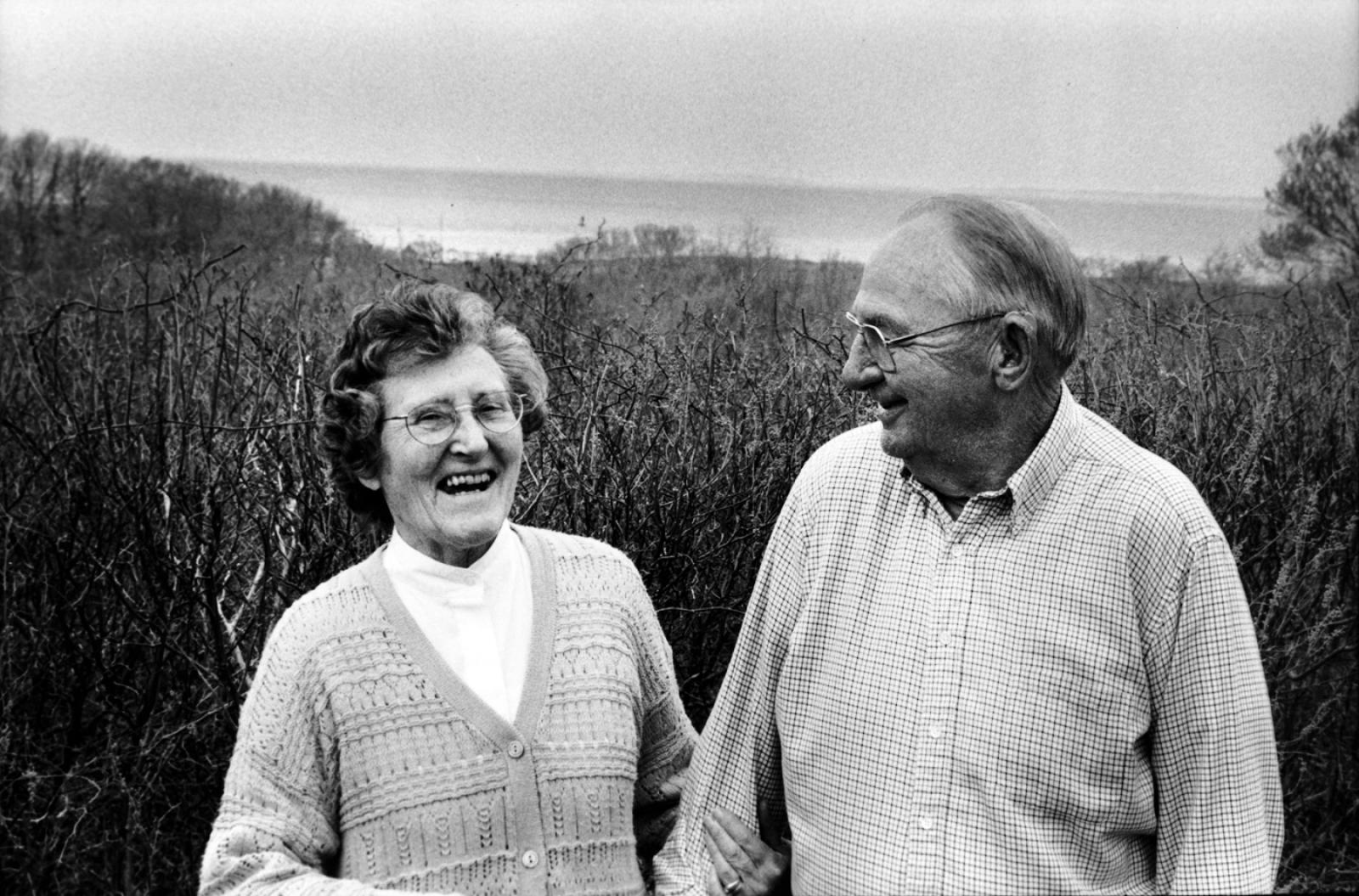
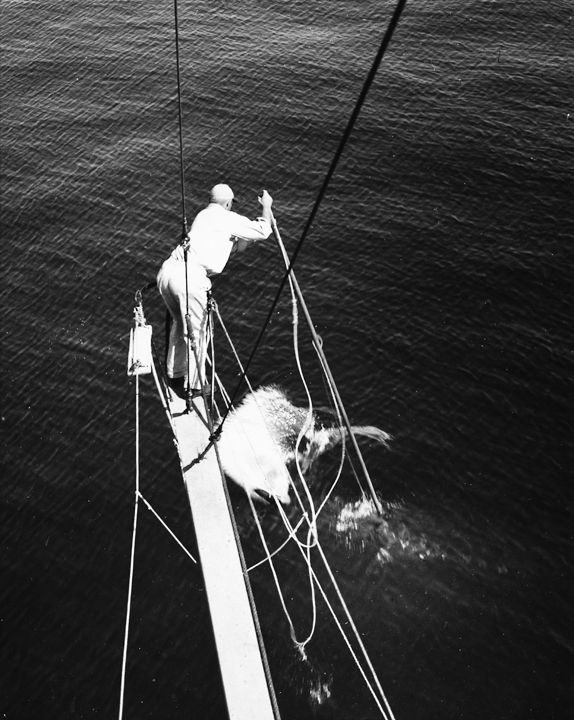
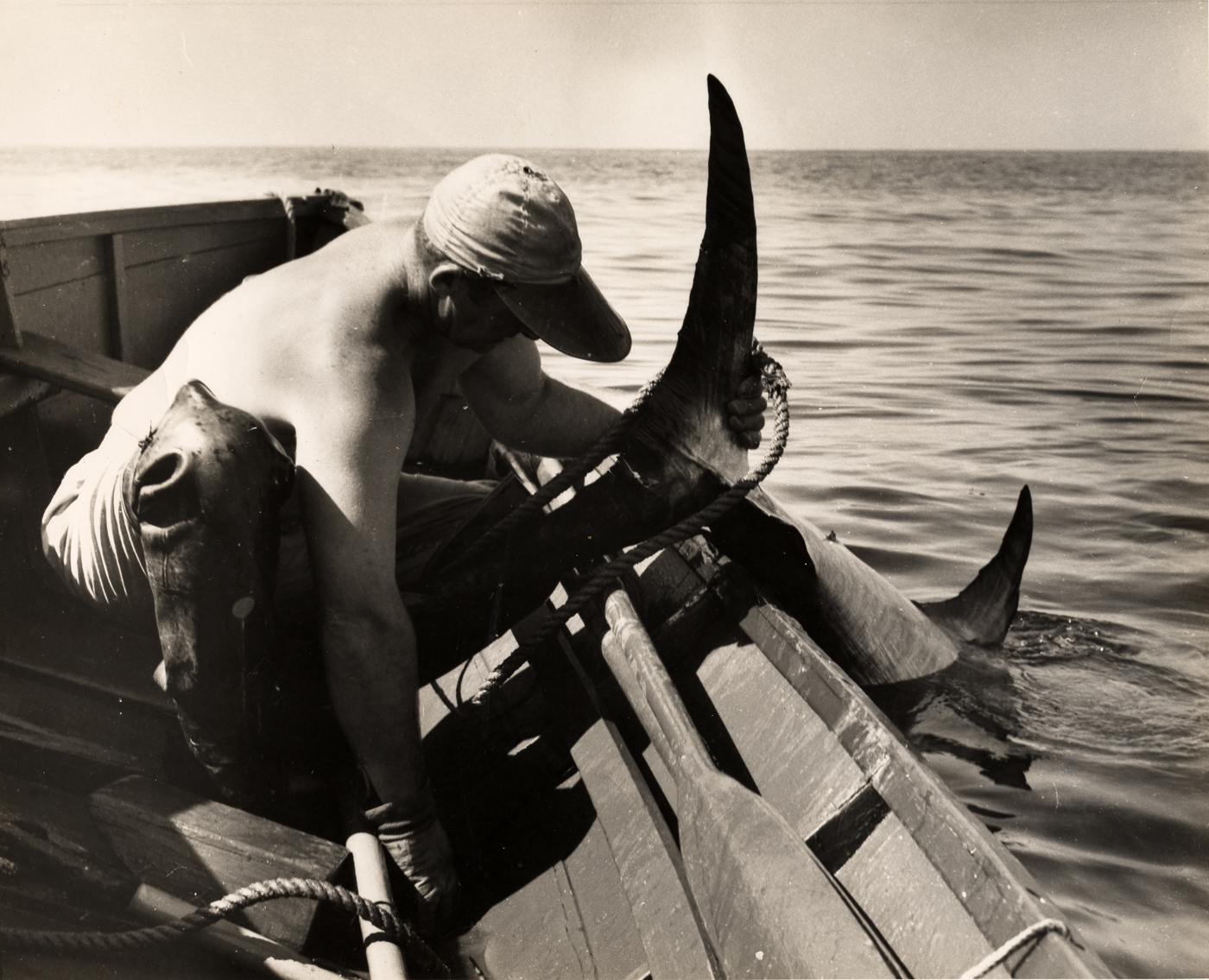
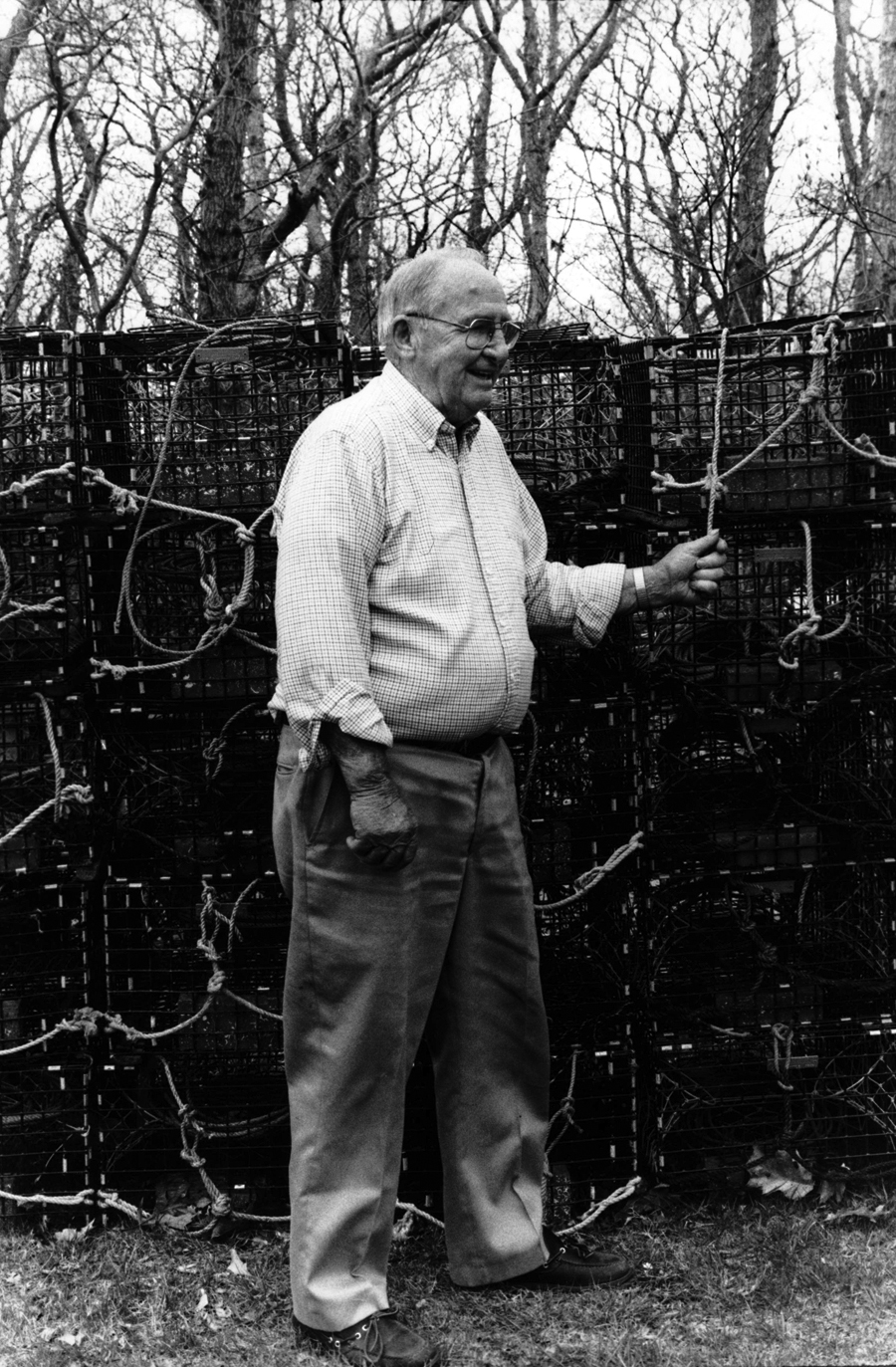


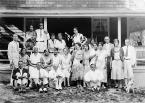

Comments
Comment policy »